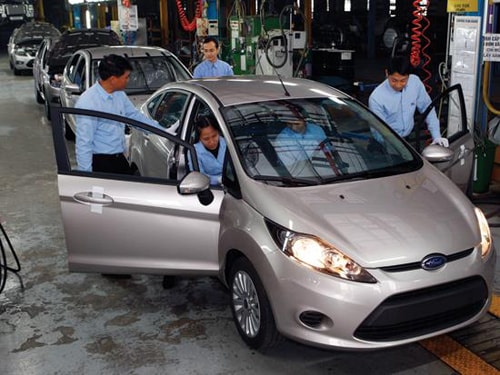Leading US corporations seek opportunities in Vietnam
Right before the mid-term Vietnam Business Forum (VBF) taking place on June 5 in Hanoi, a US business delegation, led by Mr. Alexander C. Feldman, Chairman of the US-ASEAN Business Council, visited and sought investment opportunities in Vietnam.
 |
There were not as many big names as in the visit at the end of February 2014, such as Boeing, General Electric, Coca-Cola, Exxon Mobil, Abbott, PepsiCo, Ford..., but Mead Johnson, General Atlantic, or AES, Marsh & McLennan, Qualcomm... of this visit are also leading corporations in the US.
“We came to Vietnam to continue to affirm the interest, trust and determination of US corporations to invest in Vietnam,” Mr. Feldman affirmed to Minister of Planning and Investment Bui Quang Vinh.
The business delegation of the US-ASEAN Business Council, when working with Minister Bui Quang Vinh at the end of February this year, also affirmed a similar thing.
At that time, the leader of the US-ASEAN Business Council shared that there had never been such a large delegation of US businesses coming to Vietnam and that was a recognition of the level of interest of US businesses in Vietnam.
“US businesses are very excited about the opportunities opened up by the Vietnamese market, especially the bright future when Vietnam joins the Trans-Pacific Partnership Agreement (TPP),” said the Council leader.
This was once again affirmed by Mr. Feldman, right before the VBF, with the theme "From program to action - Preparing for new trade agreements".
At the end of February 2014, when reporting to the Ministry of Planning and Investment, the leaders of Exxon Mobil Corporation shared the investment plan for the Central Gas - Power Complex Project, with a capital scale that could reach up to 20 billion USD.
Although not in Vietnam in early June, at the end of May 2014, two Vice Presidents of Exxon Mobil Corporation came to Vietnam and met with senior officials of the Vietnamese Government. Information related to the above project was not mentioned, but the commitment to continue cooperation with the Vietnam Oil and Gas Group (PVN), to bring benefits to both sides, was once again affirmed.
It should also be mentioned that between these two trips were events related to acts of violence and factory vandalism in a number of industrial zones across the country, causing public concern that it would affect Vietnam's investment environment, as well as the flow of foreign direct investment (FDI) into Vietnam in the coming time.
However, it seems that the confidence of US investors in Vietnam has not decreased, as there continues to be interest in infrastructure projects, renewable energy projects, as well as the possibility of participating in the equitization process of state-owned enterprises in Vietnam.
Similarly, trust was also confirmed by the FDI projects that Binh Duong province just awarded to investors on June 4. Accordingly, among the 41 projects that were granted investment certificates this time, 10 projects were registered after the day of the disturbance.
The total investment capital for these projects is not too large (146 million USD), but the presence of investors from Japan (10 projects, registered capital of 48 million USD), Korea (9 projects, 28 million USD), China (5 projects, 18 million USD), Hong Kong (4 projects, 22 million USD), Taiwan (3 projects, 7.5 million USD), in the second round of investment certificate granting in 2014 of Binh Duong province - one of the provinces in the "hot spot" of factory demolition - is more than a commitment.
Previously, information from the Hai Phong Industrial Park Management Board said that it had just granted an investment certificate to Bluecom Co., Ltd. (Korea) to implement the Project of TV speaker, vibration motor (phone), bluetooth headset factory in Trang Due Industrial Park (Dinh Vu - Cat Hai Economic Zone, Hai Phong). The project has an investment capital of 50 million USD and is expected to start operating in July 2014 in some items.
These projects will be recorded in FDI capital in June 2014 and will contribute to improving total FDI capital into Vietnam in the first half of the year, which is on a downward trend.
Regarding this issue, in a June 2014 macroeconomic report titled A Closer Look at FDI and Trade, HSBC Bank stated that, of the FDI capital currently in Vietnam, the majority comes from investors from Japan, South Korea, the US and Taiwan. Although registered FDI capital from China has increased in recent years, the total investment capital from China is still modest, so the economic relationship between Vietnam and China is simply a level 1 supply chain relationship, rather than an investment relationship.
“The main investors remain unchanged and FDI capital still tends to go to Vietnam,” HSBC commented, adding that HSBC has long argued that Southeast Asian (ASEAN) countries, especially Vietnam and Indonesia, are likely to benefit from the shift out of China of labor-intensive manufacturing companies as investment diversification.
This was also confirmed by Mr. Hideo Okubo, Chairman of Forval Group, recently with Dau Tu Newspaper. “The wave of Japanese investment abroad is still following the trend of China +1 and Thailand +1. When looking towards the Asian region, Japanese investors still look to Vietnam and Indonesia as the first investment destinations. The wave of investment from Japan to Vietnam will increase, not decrease,” said Mr. Okubo.
According to baocongthuong
